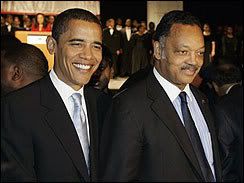
When I campaigned for Jesse Jackson back in 1984, Black children told me that Jesse could not become president because white people would never allow it. They might assassinate him or isolate him or otherwise refuse him, but they would not allow him to take the reigns of power.
In light of the tragic history of assassination of Black leaders in America, from the non-violent Martin Luther King, Jr. to the leaders of the "pick up the gun" Panther Party, I could not argue that these children's observations were unfounded. They were a matter of historical fact.
So, I could only argue that we had to continue trying, in spite of the forces arrayed against us, just as we had during slavery and Jim Crow.

Today in the Washington Post, Eugene Robinson plumbs the psyche of Black America, questioning whether we can believe that America will open its minds and its hearts to Barack Obama. Although it is apparent that Americans have already opened their pocketbooks, making Obama a rival to Hillary Clinton on the financial plane, the voting and caucusing has yet to begin.
By Eugene Robinson
Tuesday, July 31, 2007; Page A19
Are white Americans really, truly prepared to elect an African American president? Seriously, is a nation with such a long and shameful history of brutal slavery, Jim Crow segregation and persistent racism actually going to put a black man in the White House?
One of Barack Obama's principal tasks in the coming months may be convincing African American voters that this whole phenomenon -- a black candidate with a well-financed campaign, proven crossover appeal and a real chance to win -- isn't just another cruel illusion.
I hear from African Americans who are excited about Obama's candidacy but who suspect that somehow, when push comes to shove, "they" won't let him win. It's unclear who "they" might be -- white voters, the "power structure," the alignment of the stars -- and it's unclear how "they" are going to thwart Obama's ambition. The point is that, somehow, he'll be denied.
This anecdotal evidence finds some empirical support in the polls, although it's far from definitive. A recent CNN poll of Democrats in South Carolina -- a crucial, early-primary state where African Americans will cast about half the Democratic votes -- showed Hillary Clinton leading Obama by a bigger margin among blacks than among whites. And while white respondents thought Clinton had only a slightly better chance of winning the 2008 general election than Obama, blacks who were polled thought Clinton was fully twice as likely to beat a generic Republican opponent. (. . . ) Eugene Robinson, Washington Post
I am not among those who is willing to fatalistically accept the proposition that Barack Obama would necessarily lose the nomination or the general election simply because he is Black. The state of Massachusetts, where I was born and which has a 5% Black population, nonetheless elected its first African-American governor last year, Governor Deval Patrick. Clearly, much of what once seemed impossible is, nevertheless, possible.
As I learned when going from being a flunked and failed college student to a magna cum laude college graduate and member of the Bar, the only way to determine the line between the impossible and the possible is to to try to attempt what seems impossible and thereby prove that, in fact, the apparently "impossible" actually IS within the realm of the possible. This is a mataphysical quest without which there can be no human progress in any realm of endeavor, regardless of gender and skin-color.
As I said a couple of days ago, both Hillary Clinton and Barack Obama have to prove that the victory which once seemed impossible actually lies within the realm of the possible.
But Black people are more than familiar with this conundrum. If we have gone to church for any reason at all lo these long centuries, it was because that which was essential for our survival so often seemed outside the reach of reason.





No comments:
Post a Comment